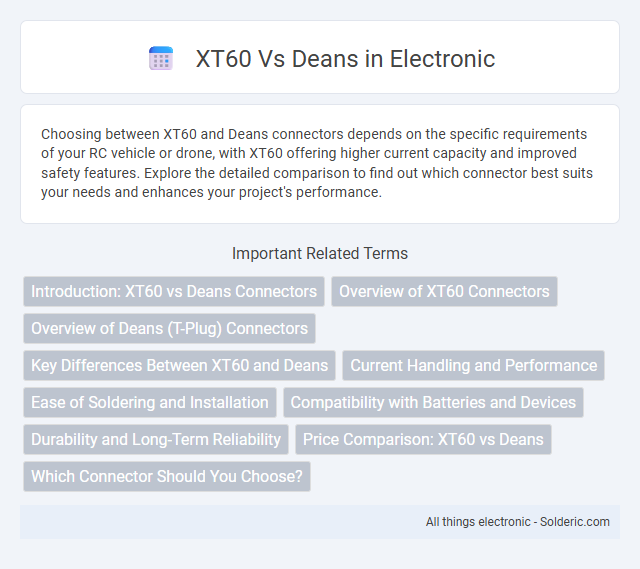Choosing between XT60 and Deans connectors depends on the specific requirements of your RC vehicle or drone, with XT60 offering higher current capacity and improved safety features. Explore the detailed comparison to find out which connector best suits your needs and enhances your project's performance.
Comparison Table
| Feature | XT60 Connector | Deans Connector |
|---|---|---|
| Current Rating | Up to 60A continuous | Up to 50A continuous |
| Connector Type | Bullet connectors, male/female | T-style (flat blade) connectors |
| Voltage Handling | Up to 500V | Up to 300V |
| Durability | High, heat-resistant nylon housing | Moderate, plastic housing prone to wear |
| Size & Weight | Bulkier, heavier | Smaller, lighter |
| Connection Security | Polarized, tight fit | Polarized, less secure under vibration |
| Common Usage | RC drones, LiPo batteries, hobby electronics | RC cars, boats, hobby electronics |
| Ease of Soldering | Moderate difficulty | Easy, flat blades simplify soldering |
| Price | Moderate | Low |
Introduction: XT60 vs Deans Connectors
XT60 connectors offer high-current handling up to 60A with a secure, polarized design ideal for RC batteries and drones. Deans connectors provide low resistance and compact size, supporting up to 40A continuous current, favored in high-performance RC applications. Choosing the right connector impacts your device's efficiency, safety, and reliability during power transfer.
Overview of XT60 Connectors
XT60 connectors are designed for high-current applications, typically supporting continuous currents up to 60 amps, making them ideal for RC vehicles, drones, and battery packs. Their bullet-style, gold-plated connectors provide a secure, low-resistance connection that reduces power loss and heat build-up. If you prioritize durability and a reliable locking mechanism for your battery connections, XT60 connectors offer an effective solution compared to alternatives like Deans.
Overview of Deans (T-Plug) Connectors
Deans (T-Plug) connectors are widely recognized for their compact design and low resistance, making them a popular choice in RC vehicles and drones for efficient power transfer. These connectors feature a simple two-pin layout with a secure snap-fit connection that minimizes voltage drop and heat buildup. Your choice of Deans connectors ensures reliable, high-current handling ideal for high-performance battery packs and ESCs.
Key Differences Between XT60 and Deans
XT60 connectors offer superior current handling capabilities up to 60A and robust nylon housing, ensuring durability and reliable high-power connections in RC vehicles and drones. Deans connectors, known as T-plugs, provide a lower profile design with gold-plated contacts for efficient conductivity but typically handle currents up to 40-50A, making them more suitable for moderate power applications. The key differences lie in XT60's higher amperage rating and rugged build versus Deans' compact shape and ease of soldering, influencing the choice based on power requirements and space constraints.
Current Handling and Performance
XT60 connectors excel in current handling, typically rated for continuous currents up to 60A, making them reliable for high-performance applications and preventing overheating during heavy loads. Deans connectors, while compact and lightweight, support slightly lower continuous currents around 50A but offer excellent conductivity with minimal voltage drop due to their flat surface contact design. Choosing between XT60 and Deans depends on your device's current demands, with XT60 preferred for sustained high-current performance and Deans ideal for smaller setups requiring efficient power delivery.
Ease of Soldering and Installation
XT60 connectors feature thick, nickel-plated terminals and a high-quality nylon shell, allowing for easier heat transfer and solder flow during installation. Deans connectors, with their smaller and flatter terminals, require more precise soldering skills and careful heat application to avoid damaging the plastic housing. The robust construction of XT60 connectors generally results in a faster, more reliable soldering process for users of all experience levels.
Compatibility with Batteries and Devices
XT60 connectors offer broad compatibility with a wide range of lithium polymer (LiPo) batteries and devices due to their standard 60-amp rating, making them ideal for high-power applications and larger battery packs. Deans connectors, also known as T-plugs, are favored in smaller devices and racing drones for their compact size and reliable 50-amp current rating but may require adapters for compatibility with some battery models. Ensuring your choice matches your battery type and device specifications prevents performance issues and enhances your system's efficiency.
Durability and Long-Term Reliability
XT60 connectors offer superior durability with high-quality nylon housing and gold-plated contacts that resist corrosion and withstand frequent plugging and unplugging, making them ideal for long-term reliability in high-current applications. Deans connectors, while popular for their compact design and low resistance, tend to wear out faster due to thinner plastic housing and less robust contact pins, which may lead to connection failures over time. For enduring performance and consistent power delivery, XT60 connectors generally provide a more reliable solution in demanding RC and UAV environments.
Price Comparison: XT60 vs Deans
XT60 connectors typically range from $1 to $2 each, offering a cost-effective option for hobbyists and professionals, while Deans connectors are generally priced between $2 to $4 each, reflecting their premium build and reliability. The price difference becomes significant when purchasing in bulk, making XT60 connectors more suitable for budget-conscious projects. Despite the higher cost, Deans connectors are often favored for high-current applications due to their low-resistance contact design.
Which Connector Should You Choose?
XT60 connectors offer high current handling up to 60A and superior heat resistance, making them ideal for powerful RC vehicles and drones. Deans connectors provide a compact design with low resistance and efficient power transfer, favored in lightweight applications and tight spaces. Choose XT60 for robustness and higher current demands; opt for Deans when size constraints and minimal voltage drop are critical.
XT60 vs Deans Infographic

 solderic.com
solderic.com